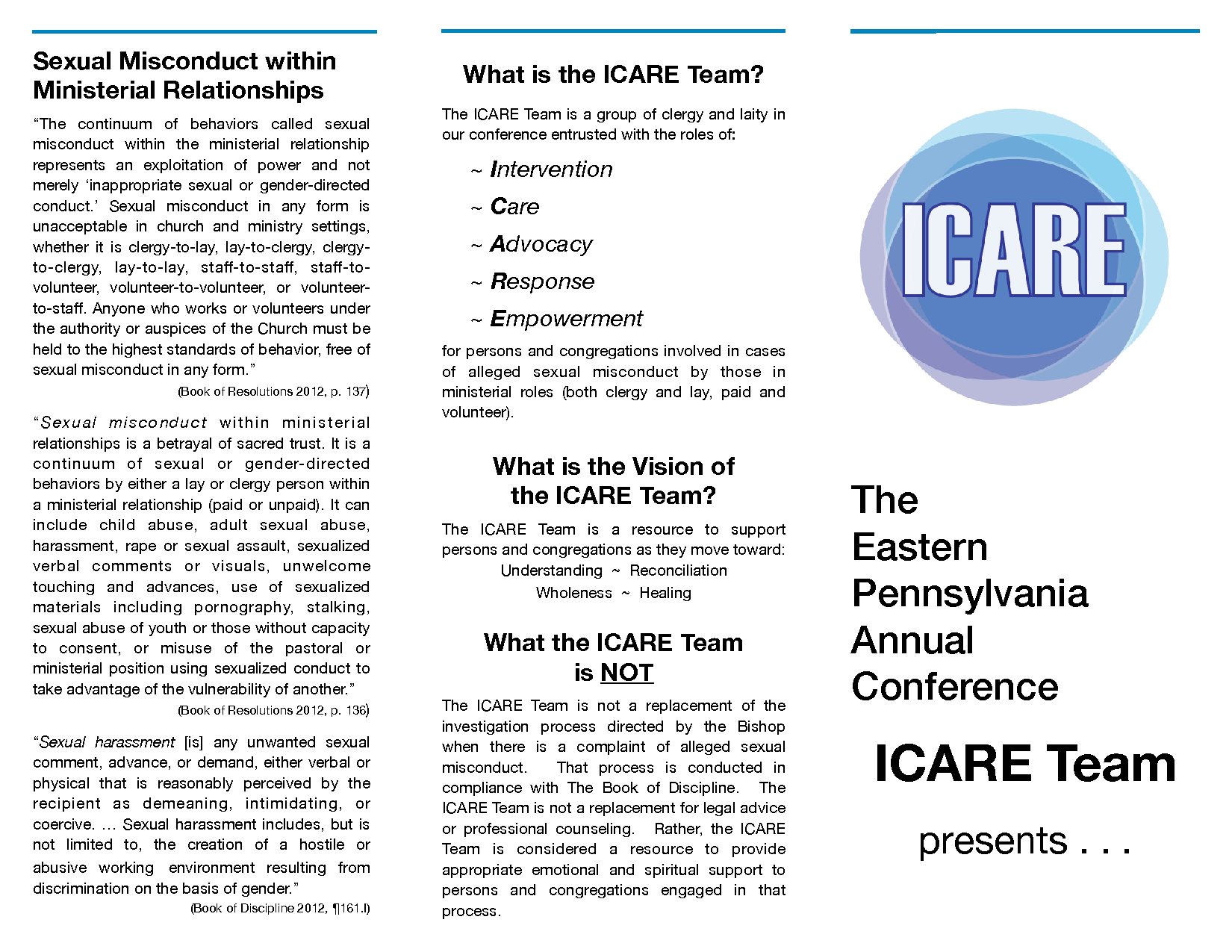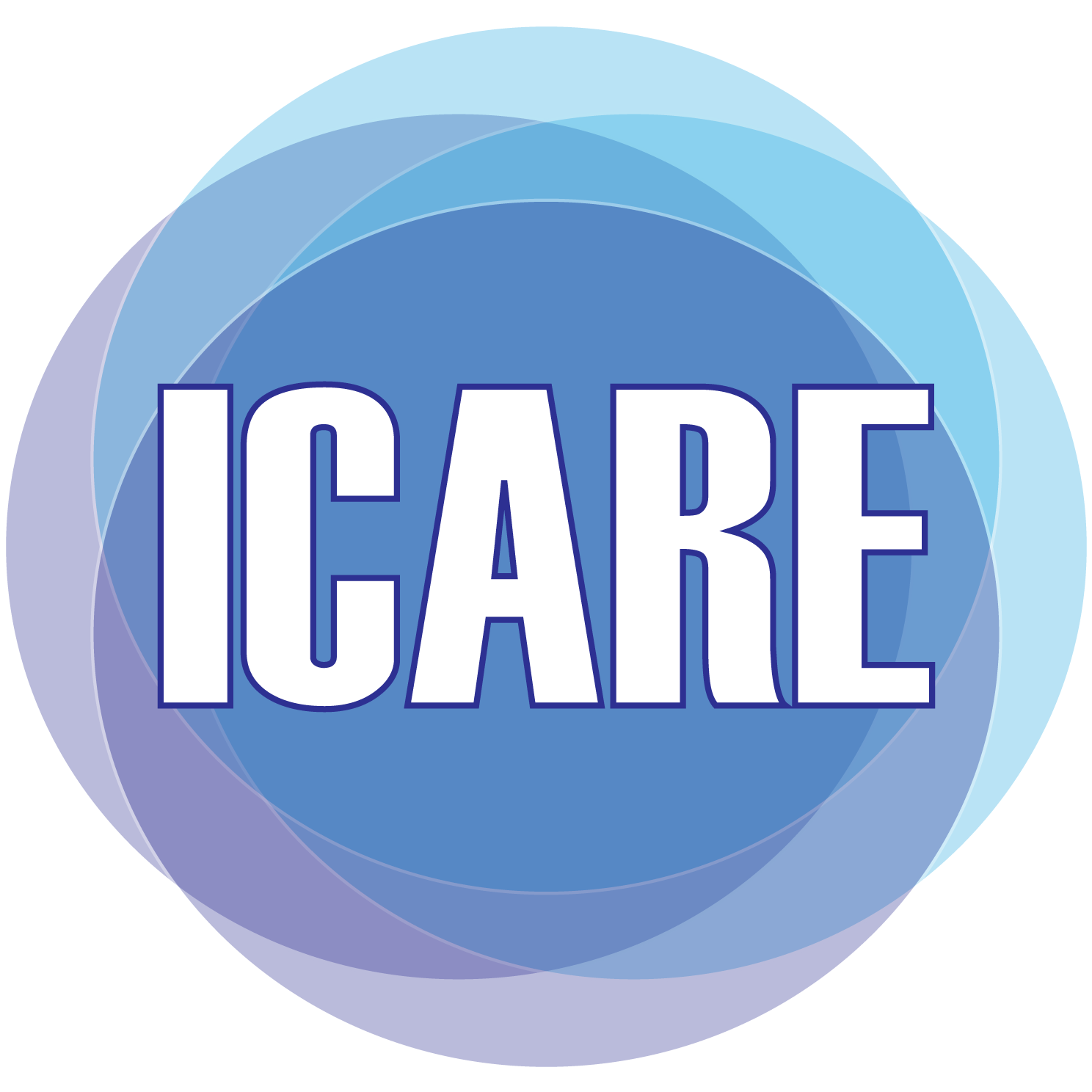Reporting Sexual Misconduct
Do you believe you have witnessed or been a victim of sexual misconduct in one of the churches or ministries of the Eastern PA Conference of The United Methodist Church? We are here to help!
- Eastern PA Conference Sexual Ethics Policy
- For your options for reporting, see "Possible Points of Entry..."
- For understanding what to expect during the process, see "What to Expect..."
- For definitions of Sexual Misconduct, see "Definitions..."
- To send a confidential email to the icare team: icare@epaumc.church
The ICARE Team is a group of clergy and laity in our conference entrusted with the roles of: Intervention, Care, Advocacy, Response, and Empowerment for persons and congregations involved in cases of alleged sexual misconduct by those in ministerial roles (both clergy and lay, paid and volunteer).

The ICARE Team responds upon request by the bishop to situations involving sexual misconduct related to congregations and/or clergy of the Eastern Pennsylvania Conference.
We affirm that sexuality is God’s good gift to all persons. We call everyone to responsible stewardship of this sacred gift… 2016 Book of Discipline ¶161.G
Te EPA Conference is committed to providing a safe, respectful, and nurturing environment in keeping with God’s sacred trust. The EPA Conference bears affirmative responsibility to create an environment of hospitality for all persons that encourages respect, equality, and kinship in Christ. Sexual misconduct (including sexual abuse, sexual harassment, and sexual exploitation) violates the mission of the church to make disciples of Jesus Christ for the transformation of the world.
The EPA Conference provides procedures for reporting and responding to allegations of sexual misconduct by persons in ministerial roles (both lay and clergy, paid and volunteer, see Book of Resolutions 2012, p. 137, for examples), who have the responsibility to avoid actions and words that hurt others, but also to protect the vulnerable against actions or words, that cause harm. The EPA Conference will not condone or tolerate instances of sexual misconduct. The commitment is to procedural justice and pastoral concern through a fair process of justice making for victims and survivors, real accountability for abusers, and healing for all parties, including affected congregations.
Our primary goal is to avoid the worst!
The challenges and demands of the world deplete us. Sadly, more times than not, the worst occurs when we allow ourselves to become depleted. The best prevention is a program of self-care; a program that is focused on wholeness of body, mind, spirit.
For additional information refer to the General Commission on the Status and Role of Women: www.umsexualethics.org and www.gcsrw.org
Sexual Ethics And Conduct Policies And Procedures
ICARE Team members are available to offer guidance and support. You may contact the co-chairs--the Rev. Dr. Brunilda Martínez, and the Rev. Susan L. Worrell--through the confidential email address: icare@epaumc.church
While the ICARE Team works within a Covenant of Confidentiality, it is important to note that all ICARE Team members are Mandated Reporters. That is, if a Team member receives a report involving someone under the age of 18, there is NO discretion. It MUST be reported within 24 hours.
In addition, it is important to note that within the Covenant of Confidentiality, should a report be received describing a situation so egregious as to put the reporting individual, another individual, and/or the congregation at risk, the ICARE Team member will disclose:
- to whom it needs to be disclosed (Normally Bishop and/or District Superintendent);
- to the level it needs to be disclosed;
- when it needs to be disclosed.
When the worst occurs
When a signed complaint is received, at the invitation of the Bishop, the District Superintendent and Pastor/Congregation, the ICARE Team provides pastoral care for the complainant and family, for the accused and his/her or their family, and for the congregation, agency or institution through the following operating guidelines and functions:
- Insure the safety of the complainant/alleged victim.
- Recognition of the impact on all the persons involved.
- Observe confidentiality.
- Be in contact with the District Superintendent as appropriate.
- Serve to resource therapy, civil and church procedures, and supportive secular agencies for all involved: complainant/victim.
Sexual Misconduct Response Guidelines
The following guidelines are the steps to be followed in cases of Sexual Misconduct. Any person who has credible reason to believe a violation of the Eastern Pennsylvania Annual Conference’s Policy on Sexual Misconduct Involving Adults (June 2016) has occurred should bring the matter to the attention of church authorities. (For reporting abuse of children or youth, see Eastern PA Safe Sanctuaries Policy.)
These are the usual procedures for handling cases for reported sexual misconduct involving United Methodist churches, their pastoral and lay staff, and laity.
Possible Points of Entry for Reporting
There are several possible ways to initiate the process in cases of alleged sexual misconduct.
- Contact the Bishop’s office
- Contact the District Superintendent
- Contact your Pastor (if a lay person is involved)
- Contact your Staff Parish Relations Committee Chair (if a clergy person is involved)
- Contact ICARE Chairperson through confidential email address: icare@epaumc.church
In any case, once contact is made, there is an opportunity to explain the circumstances of the alleged misconduct. In addition, the intervention process is explained. This is a time of listening and sharing information.
The Bishop’s representatives, District Superintendents and ICARE Team members are trained to listen and help the person reporting the alleged misconduct to decide what her/his next step will be.
- The ICARE Team may be asked to assist in making a formal complaint, which must be in writing. Refer to the Book of Discipline 2016, paragraph 362, for specific procedures for filing and handling a complaint.
- When a formal complaint is written, it is filed with the appropriate District Superintendent, who then notifies the Bishop.
- If a formal (written) complaint is not filed, there can be no further administrative or judicial action.
- The persons and/or congregation involved may still receive ICARE support if desired, and approved by the Bishop.
What to Expect if a Complaint is Filed
Once a complaint is filed, the Bishop and the District Superintendent will meet to confer in prayer and concern. This marks the beginning of the formal intervention process. It is at this point that the person making the complaint and the person accused of alleged misconduct will each be offered the support of an ICARE Team member.
- If the offer of support is accepted, each party will receive a different support person from the ICARE Team.
- The Bishop, in consultation with the District Superintendent and the ICARE Team Chairpersons, will determine which ICARE Team Member(s) will be assigned.
- Family members may, if desired, also receive ICARE Team support.
As a complaint is investigated, it may be helpful to the District Superintendent and the congregation to assign support persons for the congregation. If so, the Bishop, in consultation with the District Superintendent and the ICARE Team Chairpersons, will assign a Congregational ICARE Support Team. These persons provide care and support for members of the congregation as they seek to cope with the alleged misconduct. In the case where a pastor is to be suspended, a Congregational ICARE Support Team will be provided.
Cases involving legal charges beyond the local church often hold requirements that affect how ICARE can work.
Definitions, According to the United Methodist General Conference
“The continuum of behaviors called sexual misconduct within the ministerial relationship represents an exploitation of power and not merely ‘inappropriate sexual or gender-directed conduct.’ Sexual misconduct in any form is unacceptable in church and ministry settings whether it is clergy-to-lay, lay-to-clergy, clergy-to-clergy, lay-to-lay, staff-to-staff, staff-to-volunteer, volunteer-to-volunteer, or volunteer-to-staff. Anyone who works or volunteers under the authority or auspices of the Church must be held to the highest standards of behavior, free of sexual misconduct in any form.” (Book of Resolutions 2012, p. 137)
Sexual Misconduct
“Sexual misconduct within ministerial relationships is a betrayal of sacred trust. It is a continuum of sexual or gender-directed behaviors by either a lay or clergy person within a ministerial relationship (paid or unpaid). It can include child abuse, adult sexual abuse, harassment, rape or sexual assault, sexualized verbal comments or visuals, unwelcome touching and advances, use of sexualized materials including pornography, stalking, sexual abuse of youth or those without capacity to consent, or misuse of the pastoral or ministerial position using sexualized conduct to take advantage of the vulnerability of another.” (Book of Resolutions 2012, p. 136)
Sexual Harassment
“Sexual harassment [is] any unwanted sexual comment, advance, or demand, either verbal or physical that is reasonably perceived by the recipient as demeaning, intimidating, or coercive. … Sexual harassment includes, but is not limited to, the creation of a hostile or abusive working environment resulting from discrimination on the basis of gender.” (Book of Discipline 2016, ¶161.J) “[I]t is unwanted sexual or gender-directed behavior within a pastoral, employment, ministerial (including volunteers), mentor, or colleague relationship that is so severe or pervasive that it alters the conditions of employment or volunteer work or unreasonably interferes with the employee or volunteer’s performance by creating a hostile environment that can include unwanted sexual jokes, repeated advances, touching, displays, or comments that insult, degrade, or sexually exploit women, men, elders, children, or youth.” (Book of Resolutions 2012, p. 136)
Sexual Abuse
“Sexual abuse [in ministry] is a form of sexual misconduct and occurs when a person within a ministerial role of leadership (lay or clergy, pastor, educator, counselor, youth leader, or other position of leadership) engages in sexual contact or sexualized behavior with a congregant, client, employee, student, staff member, coworker, or volunteer,” except within the bounds of marriage. (Book of Resolutions 2012, p. 136) Sexual abuse within the ministerial relationship involves a betrayal of sacred trust, a violation of the ministerial role and exploitation of those who are vulnerable.
Sexual misconduct may occur in many forms, including but not limited to face-to-face interactions or through print, electronic and/or social media. Furthermore, “the use of pornography in church programs, on church premises or with church property by persons in ministerial roles (lay and clergy) is a form of sexual misconduct.” (Book of Resolutions 2012, p. 162)
Specific Interpretations (illustrative, not exhaustive): Dating, romantic, or sexual relationships by persons appointed or assigned by the bishop. The EPA Conference is clear that such relationships between clergy and their parishioners inherently distort the ministerial relationship and “are never appropriate because of imbalance of power” (see concurring opinion to Judicial Council Decision 1228).
Therefore, the EPA Conference considers it an act of sexual misconduct for a clergyperson, certified lay minister, or other person appointed or assigned by the bishop to enter into a dating or romantic relationship with a parishioner. For the sake of maintaining healthy boundaries and preventing a betrayal of sacred trust, a ministerial leader who has a genuine desire to date a parishioner must contact their District Superintendent. In consultation with the District Superintendent a determination should be made on the reasonable course of action for the pastor/parishioner relationship before beginning a dating relationship.
Lay Harassment of Clergy
(Book of Discipline 2016, paragraph 605.9)
Clergy are generally considered to be in positions of power due to their professional role as spiritual leaders within a church. There are, however, situations in which professing members of a church have the power to create a hostile or abusive environment that undermines the ministry of the clergy person. Sexual or gender harassment of clergy, or indeed any relationship and/or behavior that undermines the ministry of persons serving within an appointment, is a chargeable offense for laity (Book of Discipline 2016, paragraph 2702.3).
Use of Pornography
(Book of Discipline 2016, paragraph 2702.1 and 2702.3; and specifically, Book of Resolutions 2012, pp. 155-63.])
The Social Principles of the United Methodist Church (Book of Discipline 2016 paragraph 161Q) include this statement: “We deplore all forms of the commercialization, abuse, and exploitation of sex.” As a church, we affirm the image of God in every human being and our sexuality as a good gift of God. The use, participation in, or production of pornographic materials in any way, shape or form, in any location including on private communication devices constitutes an objectification of a child of God, and is a serious denial of the image of God in the persons involved. The Eastern Pennsylvania Annual Conference deplores the use and dissemination of pornography in any setting.
Reporting
Any person who has credible reason to believe that a violation of this policy has occurred should bring the matter to the attention of the Pastor-if a ministerial leader of the congregation is involved, the District Superintendent - if the Pastor is presumably involved, and in all cases the Bishop will be informed. (For reporting abuse of children and youth, see EPA Safe Sanctuary Policy.) Every complaint of sexual misconduct shall be taken very seriously. Nothing in this policy requires the person alleging sexual misconduct to report the matter to the individual who is the subject of the allegation. See Book of Discipline 2016, paragraph 363 for specific procedures for filing and handling complaints.
The General Commission on the Status and Role of Women offers guidance; see www.umsexualethics.org.

Contact Us
Confidential Email Address
For reporting and assistance. This secure email address is accessible only by the ICARE chairpersons and the bishop: icare@epaumc.church

The Rev. Dr. Brunilda Martínez
ICARE Team, Co-Chair
Truman Brooks
ICARE Team, Co-Chair
